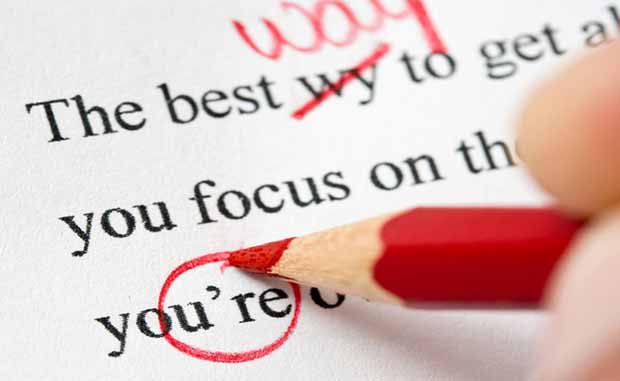10 Feb
2018
Who Needs a Proofreader Anyway?
There are answers to this question on – literally – every street corner. I challenge you to walk down any commercial street, passing a dozen or so businesses, and not come across at least one sign with some spelling or punctuation error. But how much does it matter? If the local greengrocer is offering “Potato’s” for sale, or the coffee shop is offering “expressos”, does it really hurt their business? Likely not – it’s possibly just grammar nerds like me that wince involuntarily (and yearn to take a red pen and correct the sign).
In more formal situations though, I would say it does matter. Those buying vegetables will forgive the shopkeeper’s poor grasp of grammar as long as his vegetables are fresh and well priced and people needing their shot of coffee will likely just smile to themselves but go ahead and order their espresso regardless; however, typos and errors in business writing simply serve to make the writer look – at best – careless and rushed – at worst – unprofessional and possibly unreliable.
I was amused, but also a little concerned, to receive a communication asking me to meet the sender on Tuesday February 15th at 3:30 am! I correctly interpreted this as meaning Thursday February 15th at 3:30 pm. (Had she really wanted to see me at 3:30 am I would have had to politely decline!) The concerning factor, however, was that this communication came from the English Language department of a reputable university. Of course, I’m aware that the senior administrator concerned was likely writing in a rush, while trying to simultaneously deal with a zillion other issues or – in fact – may have left it to an assistant (also in a rush) to write; nonetheless, it doesn’t give the best impression if an academic institution, even in a casual email, makes such errors. Regrettably, the busier a person is, the more emails they likely read and write in a day and the greater the possibility for an error in communication. Easy to say “always read through your emails before pressing ‘send'” but if you’re writing hundreds a day, likely you just don’t have the time. (And the increasing use of smartphones – with pre-populated responses to messages designed to ‘save time’ – simply exacerbates the problem, but that is an argument for another day!)
So – who needs a proofreader? I’m not suggesting that anyone should attempt to get emails professionally proofread; that would be utterly impracticable. However, if the confused times and dates in emails were also appearing on an institution’s website or other official publications, that would be considerably more serious. Reports, letters, web copy, newsletters, marketing emails, press releases, blog posts, etc. should absolutely be proofread. If you can’t afford a professional, at least have a second pair of eyes look over your writing in addition to thoroughly checking it yourself. In actual fact, basic proofreading by a professional is less expensive than you might think. At Prompt Proofing, for example, we can proofread documents in as little as 12 hours and our rates are surprisingly affordable.





